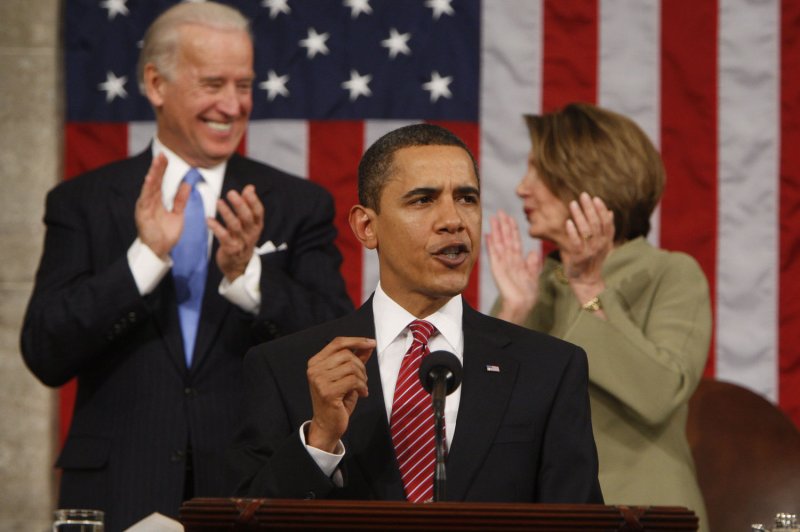1 of 3 | President Barack Obama acknowledges applause before his address to a joint session of Congress on February 24, 2009. Vice President Joe Biden and Speaker of the House Nancy Pelosi applaud behind him. File Pool Photo by Pablo Martinez Monsivais/UPI |
License Photo
Feb. 28 (UPI) -- Donald Trump will continue a presidential tradition Tuesday night in addressing a joint session of Congress, an opportunity to outline his vision for the United States shortly after inauguration.
Trump will address the joint session in the U.S. Capitol's Hall of the House of Representatives shortly after 9 p.m. Eastern. He is expected to discuss policy issues including national defense spending and immigration.
Here are the speeches from his three predecessors.
President Barack Obama, Feb. 24, 2009
Obama focused on the United States' distressed economy in his address to Congress. He promised to create or save millions of jobs, to cut taxes for most American taxpayers and to expand or extend unemployment benefits.
The "only way to fully restore America's economic strength is to make the long-term investments that will lead to new jobs, new industries and a renewed ability to compete with the rest of the world," he said.
Obama said healthcare reform could not be ignored as health expenses were causing hundreds of thousands of Americans to declare bankruptcy or lose their homes. Obama signed his signature healthcare law, the Patient Protection and Affordable Care Act, also known as Obamacare, in March 2009.
"I suffer no illusions that this will be an easy process," Obama said of healthcare reform in his address. "But I also know that nearly a century after Teddy Roosevelt first called for reform, the cost of our healthcare has weighed down our economy and the conscience of our nation long enough."
President George W. Bush, Feb. 27, 2001
Bush urged a divided U.S. Congress to support his sweeping tax cut proposal, the centerpiece of a White House budget he said would pay down the national debt, shore up federal entitlement programs and establish a $1 trillion contingency fund.
"My plan pays down an unprecedented amount of our national debt, and then when money is still left over, my plan returns it to the people who earned it in the first place," Bush said. "The people of America have been overcharged, and on their behalf I am here to ask for a refund."
Bush also briefly discussed foreign policy, saying that terrorist threats to the United States showed the need for a national missile defense system. Bush would be the U.S. president for just months before the Sept. 11, 2001, terrorist attacks.
In his address, Bush received the most applause when he called for improvements in education and tax cuts. Democrats restrained their applause as Bush's tax cuts were criticized as too large and tailored to benefit the wealthy.
President Bill Clinton, Feb. 17, 1993
Clinton called on Americans to "summon the courage to seize the day" as he implored the nation to adopt deep cuts in government spending and tax increases in his attempts to revitalize a stumbling U.S. economy.
Clinton warned the chamber of an economic disaster if his programs were not adopted. He then proposed $496 billion in cuts and new taxes over a four-year period.
"This economic plan cannot please everybody. If this package is picked apart, there will be something that will anger each of us. But if it is taken as a whole, it will help all of us," Clinton said. "Nobody likes tax increases, but let's face facts: for 20 years incomes have stalled. For years, debt has exploded. We can no longer afford to deny reality. We must play the hand we were dealt."
For several years in Clinton's second term through his departure from office, the U.S. government had a budget surplus.















